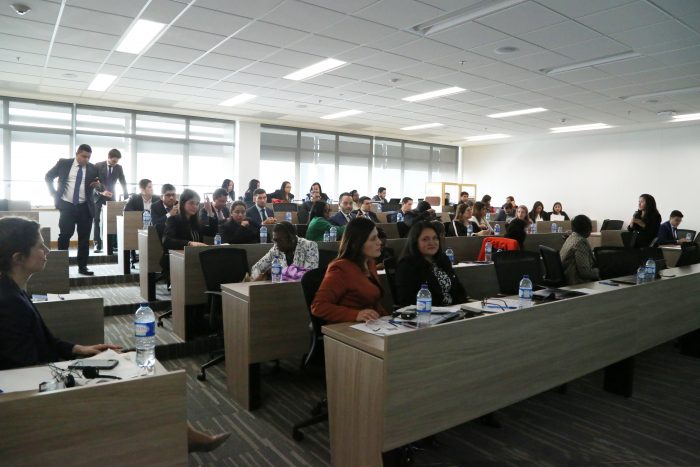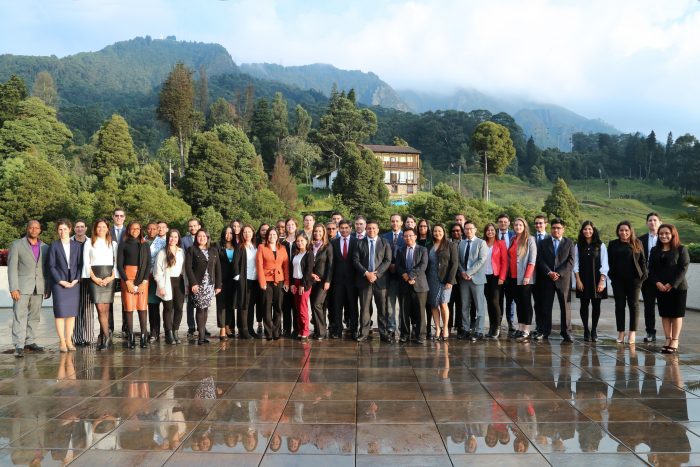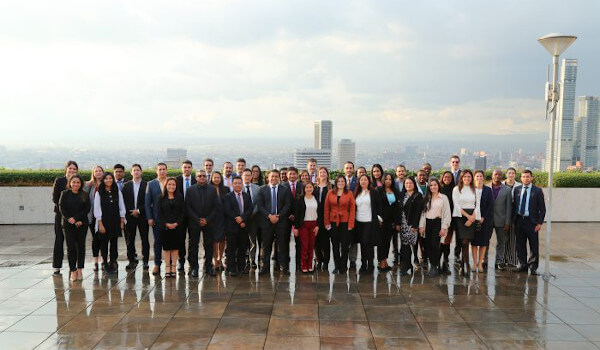Because it relies heavily on the mining sector, Bogotá was an appropriate backdrop for the first-ever training on International Taxation and the Mining Industry aimed at Latin American and Caribbean (LAC) countries, which took place from November 17 to 21, 2019. The Intergovernmental Forum on Mining, Minerals and Metals (IGF), the Organisation for Economic Co-operation and Development (OECD), the Inter-American Center of Tax Administrations (CIAT), and the University of “Externado de Colombia” joined forces to make this a reality.

More than 30 government officials from several Latin America and Caribbean countries representing tax administrations, ministries of finance and ministries of mines attended. They exchanged experiences, presented challenges and discussed issues around domestic and international taxation relating to the mining sector.
The four-day program fostered the harmonization of the knowledge level on the mining value chain and its main base erosion and profit shifting (BEPS) risks for different representatives from LAC countries at domestic and regional levels. Topics such as tax treaties, indirect transfers of mining assets, transfer pricing and mining tax incentives were discussed.
Here are some of the main takeaways:
-
One for all, all for one
Tax administrations, ministries of finance and ministries of mines play key roles in increasing mining revenue collection; therefore, it was extremely valuable to have several representatives from each of these institutions at the table, talking with each other (in some cases for the first time), trying to solve problems, and identifying opportunities to improve.

BEPS risks exist along the mining value chain, starting at exploration, then on to the development, mining, smelting and selling stages. The three government agencies mentioned above have vital roles to play at each stage. The ministries of mines have an essential role during the exploration stage when granting the mining licence or signing mining contracts. Tax administrations collect revenues once a mining company starts generating profits. Ministries of finance may be responsible for setting the overall mining tax policy framework, as well as determining other aspects of tax law that interact with the mining sector, such as tax treaties.
The LAC training was useful for all government agencies to realize that no matter where in the mining value chain they intervene, it is important to understand all activities and processes within each stage, including functions, assets and risks borne by mining companies. It is not surprising that governments that rely on mining revenues are willing to set up taskforces consisting of several agencies to work together on shared interests, as is the case in the Dominican Republic, we learned.
-
More can be done by LAC countries to address BEPS challenges in the mining sector
LAC representatives acknowledged the strengths and limitations of the existing mining tax and regulatory systems.
While most LAC countries have implemented transfer pricings regulations, more simplified approaches may be required in the case of minerals which make up a significant part of the economy in many developing and low-income countries. Some LAC countries opted to introduce the so-called sixth method, for example, as an anti-avoidance measure that primarily seeks to avoid the manipulation of prices, determining the date of shipment or delivery of the commodity as the date of the transaction.
Some measures that representatives said were urgently needed included renegotiation of unfavourable tax treaties, rethinking the use of tax incentives granted to the mining sector, and the implementation of rules to avoid undervaluation of minerals. Moreover, a few countries questioned their own mining fiscal regimes, suggesting interesting modifications that could potentially increase revenue collection.
The 2015 agreed package of BEPS measures and the CIAT “Cocktail of measures for the abusive manipulation of transfer pricing with focus in developing and low-income countries” set out international proposals for countries to consider improvements in their tax systems that could lead to mining companies paying a reasonable level of taxes—and thus respecting the general taxation principles.
-
From learning lessons to implementing reforms: Where to go from here?
A lot of ideas and knowledge were exchanged during the four-day workshop. Government representatives strongly expressed their intention to use the acquired knowledge and experience in their daily work, to share materials with colleagues, and to write reports to their authorities suggesting changes in policy or administrative procedures based on discussions at the workshop.
International or regional workshops are often the first step to initiating a change process because their multilateral and multicultural features provide the perfect arena to raise ideas that could be the basis of serious proposals affecting policy and administration. These proposals can then be supported by international and regional organizations and peers through internships, technical assistance and, of course, training. The role of CIAT, OECD, IGF and individual countries in the production of databases and technical publications is critical since they are good sources of knowledge that assist countries in making informed strategic decisions.
The LAC Workshop was also an opportunity for the IGF and OECD to commit to working with Colombia in a two-year technical assistance program on mining tax policy and administration under the BEPS in Mining Program.
For more information, contact us at secretariat@igfmining.org, GArias@ciat.org, o ctp.communications@oecd.org.
Originally posted on the blog of The Intergovernmental Forum on Mining, Minerals, Metals and Sustainable Development (IGF): Fostering Better Mining Tax Collection: Our experience in Bogotá: Fostering Better Mining Tax Collection: Our experience in Bogotá
2,065 total views, 1 views today
Disclaimer. Readers are informed that the views, thoughts, and opinions expressed in the text belong solely to the author, and not necessarily to the author's employer, organization, committee or other group the author might be associated with, nor to the Executive Secretariat of CIAT. The author is also responsible for the precision and accuracy of data and sources.



